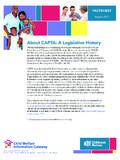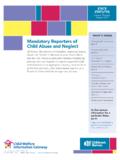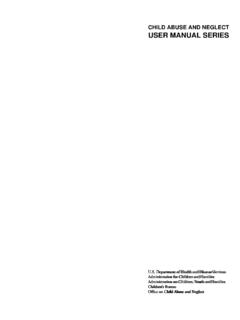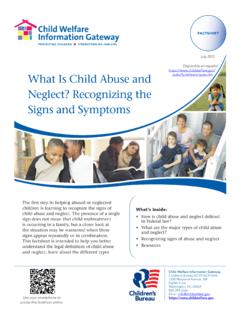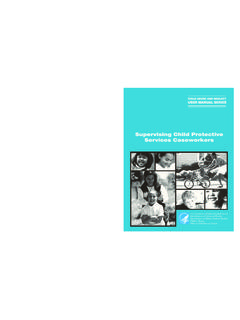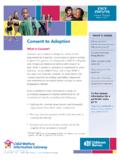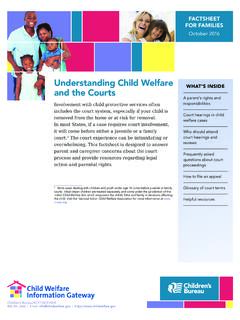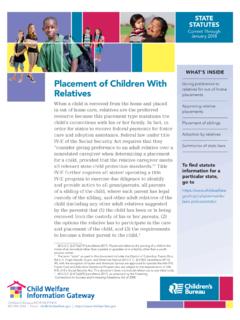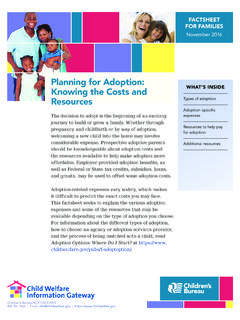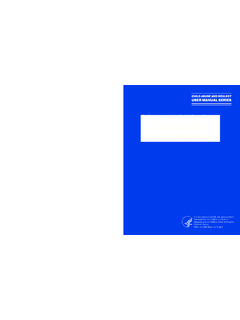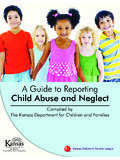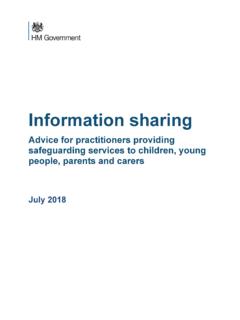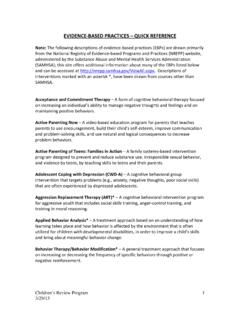Transcription of Parenting a Child or Youth
1 Child Welfare Information GatewayChildren s Bureau/ACYF/ACF/HHS1250 Maryland Avenue, SWEighth FloorWashington, DC : a Child Who Has Been Sexually Abused: A Guide for Foster and Adoptive Parents FACTSHEET FOR FAMILIESJuly 2013 Use your smartphone to access this factsheet s Inside: Educating yourself Establishing family guidelines for safety and privacy Seeking helpYou may be a current or prospective foster or adoptive parent of a Child with a known or suspected history of Child sexual abuse . In some cases, you may not be certain that abuse has occurred, but you may have suspicions based on information you received or because of the Child s behavior. You may feel confused, concerned, and unsure of the impact of prior Child maltreatment, including sexual abuse . Parenting a Child Who Has Been Sexually Abused: A Guide for Foster and Adoptive material may be freely reproduced and distributed. However, when doing so, please credit Child Welfare Information Gateway.
2 Available online at is important to understand that the term sexual abuse describes a wide range of experiences. Many factors affect how children react to abusive or neglectful experiences and how they recover. Most children who have been abused do not go on to abuse others, and many go on to live happy, healthy, successful lives. As parents, you will play an important role in your Child s recovery from childhood sexual factsheet discusses how you can help children in your care by educating yourself about Child sexual abuse , establishing guidelines for safety and privacy in your family, and understanding when and how to seek help if you need it. Reading this factsheet alone will not guarantee that you will know what to do in every circumstance, but you can use it as a resource for some of the potential challenges and rewards that lay Although the term parents is used throughout this factsheet, the information and strategies provided may be equally helpful for kinship care providers, guardians, and other YourselfOne of the most useful actions that kinship caregivers and foster and adoptive parents can take is equipping themselves with information.
3 Parents of children who may have been sexually abused can learn about the definitions of Child sexual abuse , behaviors associated with prior sexual abuse , and how sexual abuse affects children s trust of others. With this information in hand, it will be easier to recognize possible behaviors associated with past abuse and avoid taking them personally or feeling alarmed or uncertain if your Child exhibits uncommon sexual behaviors. Most importantly, you will feel capable of responding to these behaviors in sensitive and informed ways that help both you and your Is Child sexual abuse ?The National Child Traumatic Stress Network (NCTSN) defines Child sexual abuse2 as ..any interaction between a Child and an adult (or another Child ) in which the Child is used for the sexual stimulation of the perpetrator or an observer. sexual abuse can include both touching and nontouching behaviors. Touching behaviors may involve touching of the vagina, penis, breasts or buttocks, oral-genital contact, or sexual intercourse.
4 Nontouching behaviors can include voyeurism (trying to look at a Child s naked body), exhibitionism, or exposing the Child to pornography. Abusers often do not use physical force but may use play, deception, threats, or other forms of coercion to engage children and maintain their silence. Abusers frequently employ persuasive and manipulative tactics to keep the Child engaged. These tactics referred to as grooming may include buying gifts or arranging special activities, which can further confuse the victim. Child sexual abuse is defined in Federal law by the Child abuse Prevention and Treatment Act (42 sec. 5106g(4)) as2 (2009). See a Child Who Has Been Sexually Abused: A Guide for Foster and Adoptive Parents3 This material may be freely reproduced and distributed. However, when doing so, please credit Child Welfare Information Gateway. Available online at ..the employment, use, persuasion, inducement, enticement, or coercion of any Child to engage in, or assist any other person to engage in, any sexually explicit conduct or simulation of such conduct for the purpose of producing a visual depiction of such conduct; or the rape, and in cases of caretaker or inter-familial relationships, statutory rape, molestation, prostitution, or other form of sexual exploitation of children, or incest with children.
5 Within this Federal guideline, each State is responsible for establishing its own legal definition of Child sexual abuse . For more information, see the Identification of Child sexual abuse webpage on the Child Welfare Information Gateway website at legal definitions in each State, see Child Welfare Information Gateway s Definitions of Child abuse and Neglect: Signs of sexual AbuseIf you are Parenting a Child who has been removed from his or her family, you may not know for sure whether or not the Child in your care has been sexually abused. Child welfare agencies usually share all known information about your Child s history with you; however, there may be no prior record of abuse , and many children do not disclose past abuse until they feel safe. For this reason, kinship caregivers or foster or adoptive parents are sometimes the first to learn that sexual abuse has occurred. Even when there is no documentation of prior abuse , you may suspect something happened because of your Child s behavior.
6 There are no hard and fast rules about what constitutes normal sexual development and what behaviors might signal sexual abuse . Children show a range of sexual behaviors and sexual curiosity at each developmental level, and their curiosity, interest, and experimentation may occur gradually, based on their development. (See table on the following page.) However, children who have been sexually abused may demonstrate behaviors that are unusual, excessive, aggressive, or explicit. There is no one specific sign or behavior that can be considered proof that sexual abuse has definitively occurred, but there are a number of signs that are suggestive of abuse . The following signs or symptoms may suggest the possibility of Child sexual abuse : Explicit sexual knowledge beyond the Child s developmental stage sexual preoccupation indicated by language, drawings, or behaviors Inserting toys or other objects in genital openings sexual behaviors with other children that seem unusual, aggressive, or unresponsive to limits or redirection Excessive masturbation, sometimes in public, not responsive to redirection or limits Pain, itching, redness, or bleeding in the genital areas Nightmares, trouble sleeping, or fear of the darkParenting a Child Who Has Been Sexually Abused: A Guide for Foster and Adoptive material may be freely reproduced and distributed.
7 However, when doing so, please credit Child Welfare Information Gateway. Available online at Sudden or extreme mood swings: rage, fear, anger, excessive crying, or withdrawal Spacing out or appearing to be in trance Loss of appetite, or difficulty eating or swallowing Cutting, burning, or other self-mutilating behaviors Unexplained avoidance of certain people, places, or activities An older Child behaving like a much younger Child : wetting the bed or sucking a thumb, for example Talking about a new, older friend Suddenly having moneyThis list of signs and symptoms is simply that: red flags designed to alert you to the fact that the Child s behaviors may reflect an underlying problem. There are other possible explanations for some of these signs, and they need to be evaluated by a trained professional who specializes in Child sexual abuse . The following organizations offer more information about behavioral signs of sexual abuse on their websites: Stop It Now!
8 The National Child Traumatic Stress Network: Mayo Clinic: American Academy of Child and Adolescent Psychiatry: Healthy sexual Development in ChildrenChildren s sexual interest, curiosity, and behaviors develop gradually over time and may be influenced by many factors, including what children see and experience and the guidance they receive from parents and caretakers. The presence of sexual behavior is not in and of itself a conclusive sign that abuse has occurred. The table on the next page lists some of the sexual behaviors common among children of different age groups, as well as some behaviors that might be considered less common or unhealthy:33 The list is adapted from the Stop It Now! publication Prevent Child sexual abuse : Facts About Those Who Might Commit It (2005) available at Additional information was provided by Eliana Gil, , RPT-S, ATR, specialist, trainer, and consultant in working with children who have been abused and their families.
9 See a Child Who Has Been Sexually Abused: A Guide for Foster and Adoptive Parents5 This material may be freely reproduced and distributed. However, when doing so, please credit Child Welfare Information Gateway. Available online at (0 to 5 years)Common: sexual language relating to differences in body parts, bathroom talk, pregnancy, and birth Self-fondling at home and in public Showing and looking at private body partsUncommon: Discussion of sexual acts sexual contact experiences with other children Masturbation unresponsive to redirection or limits Inserting objects in genital openingsSchool Age (6 to 12 years)Common: Questions about menstruation, pregnancy, sexual behavior Experimenting with same-age children, including kissing, fondling, exhibitionism, and role-playing Masturbation at home or other private placesUncommon: Discussion of explicit sexual acts Asking adults or peers to participate in explicit sexual acts Masturbating in public or excessively to bleedingAdolescence (13 to 16 years)Common.
10 Questions about decision-making, social relationships, and sexual customs Masturbation in private Experimenting between adolescents of the same age, including open-mouth kissing, fondling, and body rubbing Voyeuristic behaviors sexual intercourse (more than half of 11th graders ) Oral sex (approximately one-third of 15-17 year olds )Uncommon: sexual interest in much younger children Aggression in touching others genitals Asking adults to participate in explicit sexual acts The use of force, aggression, or drugs to obtain complianceFor a more complete list, or if you have any questions or concerns about your Child s sexual behaviors, call the Stop It Now! toll-free helpline at ( ).4 5 454 According to a 2011 poll by the Centers for Disease Control and Prevention (CDC) at According to a 2012 CDC report at a Child Who Has Been Sexually Abused: A Guide for Foster and Adoptive material may be freely reproduced and distributed. However, when doing so, please credit Child Welfare Information Gateway.
